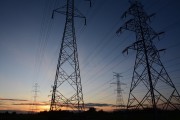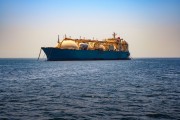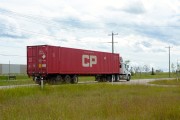By directors and CEOs of a group of 11 of Canada's largest environmental organizations.
This election seems to have many Canadians scratching their heads: What's it about? Who should I vote for? Why should I vote at all? The answers to these questions depend on whether you think the environment — and more particularly taking action on climate change right now — really matters.
Let's put this election in its real context: we are currently facing the greatest threat to the livability of our planet in the history of human civilization. Scientists like NASA's James Hansen tell us that our carbon emissions are already well into the red zone. Other scientists warn us about the relentless build-up of toxins in our environment and the snowballing extinction of species.
So it's time to discuss something more substantive than which party has the best TV ads. It's time to talk about how we are going to remake Canada's approach to living sustainably. It's time to talk about how we are going to keep the natural world, which is the foundation of our prosperity, healthy and functioning. It's a big subject, but it's also one that we should expect any party that wants to form a government to have some big ideas about.
As the people who think, eat and breathe environmental issues on a daily basis, we have plenty to say about what Canada could be doing better and what it needs to be doing right now. We've put these ideas down in a document called Tomorrow Today: How Canada Can Make a World of Difference (available at tomorrowtodaycanada.ca). It's a call to action and an agenda for how to transform our country from an environmental laggard — ranked 28th out of 29 developed countries by the OECD on a survey of key environmental indicators — to a world leader.
Let's be clear: there are big changes coming, whether we are ready or not. Unchecked climate change will devastate our environment and dramatically reshape our world. The continued loss of biodiversity will leave us more and more vulnerable to sudden and radical shifts in natural systems. And continuing to dump toxins and pollutants into our atmosphere and waterways will leave us scrambling to cope with the massive health and economic impacts of dirty air and water.
So, as the politicians like to say, we need to get ahead of the curve. We need to make the transition to a more sustainable economy by recognizing as false (in fact, insane) the practice of allowing companies to freely pollute. We need to protect far more of our forests, waters and wetlands because they are immensely valuable assets — assets most countries can only dream of - instead of treating them as an endless source of cheap resources. And we need to recognize that we have the world-leading wealth, resources and know-how to be global leaders in sustainability — all we need is the will.
The place to start is with addressing climate change. Climate change essentially takes all of our other environmental problems and puts them in overdrive. It's time for Canada to demonstrate some seriousness on this issue by putting a price on greenhouse gas emissions: a minimum of $30 a tonne (CO2 or equivalent) by 2009, rising to $75 a tonne by 2020. This would be a powerful signal sent across our society about the need to act now on getting our wasteful and polluting energy practices under control, to increase our productivity and efficiency, and to be innovators in developing new, low-carbon technologies.
A number of provinces are already moving forward along these lines. British Columbia has introduced a modest carbon tax, Quebec has some carbon pricing and Ontario is gearing up for carbon cap and trade through the Western Climate Initiative. But these efforts will be much more effective when they are coupled with strong federal laws and policies that make it clear that we will act on our international commitments to reduce our emissions and that we understand the immense benefits of moving to a green economy in a planned and controlled manner, instead of in panicked response to a growing wave of environmental disasters.
Canadian voters get this. They have told pollsters again and again that they believe action on the environment and the economy is not incompatible. In fact, more and more Canadians recognize that economic and environmental issues are really two sides of the same coin.
So don't flip a coin when it comes time to vote. Ask your candidates if they have a roadmap for a prosperous, sustainable future for this country. Show them Tomorrow Today and challenge them to respond. Let's make this an election about an issue that matters: Who can provide the leadership to take this country through some of the biggest challenges we have ever faced to a greener future?
Bruce Cox, Greenpeace Canada
Julie Gelfand, Nature Canada
Stephen Hazel, Sierra Club Canada
Anne Levesque, Canadian Parks and Wilderness Society
Bob Oliver, Pollution Probe
Devon Page, Ecojustice
Julie Gelfand, Nature Canada
Marlo Raynolds, Pembina Institute
Sidney Ribaux, Equiterre
Peter Robinson, David Suzuki Foundation
Rick Smith, Environmental Defence






